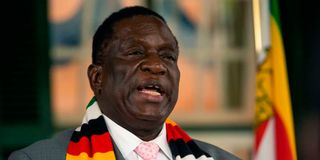Zimbabwe clamps down on poll observers, critics ahead of elections

Zimbabwean President Emmerson Mnangagwa.
Zimbabwe has come under sharp criticism for delaying the accreditation of foreign observers and journalists ahead of Wednesday’s elections, amid a crackdown on government critics.
President Emmerson Mnangagwa's government has deported at least six foreign researchers back to South Africa and the United Kingdom in the past week after accusing them of trying to interfere with the running of the polls.
The government has also refused to accredit journalists from the Voice of America’s Zimbabwe’s Service while local media practitioners say they are experiencing inordinate delays in getting accreditation from the local electoral commission.
On the eve of the harmonised presidential, parliamentary and local government elections, the United States’ Carter Centre said 30 of its 48 short-term observers were yet to be accredited by the Zimbabwe Electoral Commission (ZEC).
“Despite the Zimbabwe government’s invitation to launch an election observation mission for the August 23 elections, 30 of the Carter Centre’s 48 short-term observers still have not received accreditation from Zimbabwean authorities,” the Carter Centre said on Tuesday.
“The Carter Centre has an international reputation for providing impartial, constructive observation.
“This delay in accreditation is unprecedented in its 30-plus years of observing elections.
“It represents a severe and unwarranted obstruction to the Centre’s mission, inconsistent with commonly recognised and respected norms and practices.”
At his final campaign rallies, President Mnangagwa complained that some foreign observers were coming to Zimbabwe with preconceived views about the country’s electoral processes.
The European Union (EU) observer mission last week said it had taken note of “unacceptable attempts to discredit” it after state controlled media ran stories claiming that it bribed local journalists with whiskey and groceries.
President Mnangagwa, who came to power in 2017 following a military coup that toppled strongman Robert Mugabe, has been accused of trying to rig the elections where he is seeking his last term.
He previously said he had invited foreign observers because Zimbabwe had nothing to hide as it was organising a clean election.
Some local journalists and civil society activists have since gone to court seeking to force ZEC to give them accreditation. The Carter Centre said any further delays in the accreditation process will hinder it from deploying its observer team.
“Furthermore, false and hostile comments about the Centre and its work continue to be published in local and regional media,” it added.
“These attacks endanger Carter Centre observers.”
On Monday, Zimbabwe arrested and deported British academic Stephen Chan after accusing of being part of an alleged plot by the opposition to trigger mayhem in the event that it loses the elections.
“I was deported on arrival in Zimbabwe,” Professor Chan wrote on X, the social media formerly known as Twitter.
“The insurgency story was clearly a cover. They just don’t want people to seen an election that is not fully proper.”
Zimbabwe has a long history of disputed elections dating back to the Mugabe era.
In the last election, President Mnangagwa narrowly defeated then 40 year-old opposition leader Nelson Chamisa, who rejected the results.
The two will square-off again in tomorrow’s polls.





